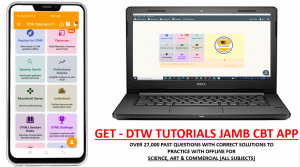PRE – COLONIAL POLITICAL SYSTEM IN NIGERIA
17.1 HAUSA/FULANI POLITICAL SYSTEM
Prior to the Sokoto Jihad or Holy war of 1804, the place now known as Northern Nigeria was ruled by the Hausas under 14 independent kingdoms/states. The defeat of the Hausas in a holy war by the Fulanis under the able leadership of Ottoman Dan Fodio led to the abolition of the Hausa kingdoms and the establishment of Fulani emirates. Each emirate was headed by an Emir. Sokoto and Gwandu were made the two headquarter for all the emirate, while Mohammed Bello son of Ottoman Dan Fodio was the head of the western section with its headquarters at Gwandu.
- THE JUDICIAL ORGAN – The judicial administration of the emirate was based on a sharia law which anchored on the teachings of Prophet Mohammed (SAW) the founder of Islam. The Alkali (Judges) administered the sharia law while minor cases were passed to the village heads to settle.
- THE LEGISLATIVE ORGAN – The legislative organ used the sharia law as the law was regarded as the law of God and supreme. Where the laws may not be covered adequately, the emir made laws”
- THE EXECUTIVE ORGAN – The executive organ saw the Emir as authoritarian in nature. Though he had a council and advisers, he could accept or reject their advice. Executive duties carried out included maintenance of law and order”
FEATURES OF THE HAUSA/FULANI PRE-COLONIAL POLITICAL ADMINISTRATION
- The Hausa/Fulani pre-colonial administration is characterized by the centralization of political power and authority. All political power was concentrated on the emir
- Islamic law, sharia was obeyed by all, including the emir but the is empowered to make laws where Islamic law is silent
- Emirate was the largest administrative structure with the emir as head of the administration. The emir was appointed by the emir of Sokoto.
- The system was theocratic in nature. Islamic religion guided the actions of the leader and his people. The emir was the political, religious and spiritual leader
- Emirate was under the control of emirs of gwandu and Sokoto, therefore lacked republican status
- The society was highly stratified, segmented into upper, middle and lower classes comprising of the talakawas.
- Emirates kept a standing army to defend the emirate and it was under the control of the madawaki.
- Regularized system of taxation and executive, legislature and judicial powers were concentrated on the emir
- Payments of tributes to sustain the administration. Rates on land, property and cattle
- Succession to the throne was hereditary
To get your E-Book PDF Download(106 pages) of the entire Government Key Points to quickly prep for JAMB & WAEC purchase here for N500 – https://dtwedustore.com/shop/government-key-points-by-dtw-tutorials-e-book-106-pages
POLITICAL STRUCTURE OF THE HAUSA/FULANI POLITICAL SYSTEM
Political structure of the Hausa/Fulani political system was based on the emirate system. It was highly centralized and every power was in the hands of the emirs. The emir was in charge of both religious, political and administrative duties.
- Waziri- Head officer and Prime minister. He carried out the day-to-day administration of the emirate on behalf of the emir. He was also in charge of all other officials.
- Galadima- in charge of the administration of the capital of the emirates
- Madawaki- The commander of the Army. in charge of the defense of the emirate
- Sarkin Fada- Head of the palace workers/officials
- Sarkin Powa- Head of the butchers
- Sarkin Dogari- Head of the police (Security). In charge of maintaining law and order
- Sarkin Ruwa- Head of water resources
- Magaji- the emir’s treasurer and administrator of finance
- Yari- Head of prisons
- Hakimi- Administrators of the districts/ district head
FORMS OF TAXATION IN THE SYSTEM
- Haraji : land tax based on annual yield
- Jangali: livestock/Animal tax
- Lizya: tax levied on slaves and strangers
- Zakat: tax on movable properties to provide alms for the poor, widows and needy
FUNCTIONS OF THE EMIRS IN THE EMIRATE
- The emirs maintain law and order
- They make the laws in the emirate
- They appoint officials in the emirate
- They organize their people for communal work e.g clearing of road paths and bushes etc
- They enforce the sharia law on their subjects
- They provide social services for their people
- He is the spiritual head of the emirate
- He imposes and collected taxes and tributes
- He allocates farmlands to his subjects
- He preserved the people’s culture and traditions
17.2 IGBO POLITICAL SYSTEM
The Igbo pre-colonial political system was described by many scholars as an acephalous political system which can be described as leaderless or chief less political system. It was centralized and based on village and direct democracy where everyone in the village has the authority to contribute in decision making
STRUCTURAL ORGANISATION OF THE IGBO POLITICAL SYSTEM
- The Village Administration: The Igbo political system is based on the village as a political unit. Each village was made up of families. Each family head held the Ofor tittle and they all formed the council of elders, which govern the village. The oldest Ofor tittle holder was referred to as the Okpara and presided over the council of elders meeting where decisions that affect the people are taken
- Age grades: The Age grades comprises of young men divided into various groups according to their ages. Each age grade has a leader who coordinates their activities. The senior age group maintain peace and order in the village and provide security against external attacks while the junior handle sanitation and other minor duties.
- The Ozo title holders: comprise of wealthy and influential men. The title is very expensive and society respected such men and they could join the council of elders to debate on issues affecting the people.
- Women associations: they participate as a powerful pressure group. They socialize with their young ones by instilling in them good morals, political values and norms. They stood against corruption and oppression.
DUTIES/FUNCTIONS OF THE COUNCIL OF ELDERS IN THE TRADITIONAL IGBO POLITICAL SYSTEM
- They possess staff of authority called the OFO
- They act as an intermediary between their families and the ancestors
- They play host to important visitors during occasions
- They negotiate peace with their neighbors and other families when they quarrel
- They can also declare war with other families
- They preside over family meetings and they settle disputes within their families
- They are the custodians of culture and make laws for the village
- They are the custodians to family land and see to their preservation
- The council discussed and took decisions on issues that related to the general welfare of the community.
- Members performed judicial, religious and traditional functions on behalf of their community
- They assign responsibilities to the age grades
ROLES OF THE IGBO POLITICAL SYSTEM
- Executive – The council of elders ensured effective implementation of decisions of the village assembly.”
- Legislative – Legislative functions were made by the village assembly, the council of elders, age grades, ozo society, the priests and their deities.”
- Judiciary – Judicial activities in Igboland were carried out by the family, council of elders, the priests of deities, age grade and the village assembly. Family heads settled disputes among his family members.
POWERS/FUNCTIONS OF THE OZO TITLE HOLDERS
- An Ozo man commands respect because of his wealth as the title is very costly
- He gives protection to strangers in the community
- He gives protection to fugitives who needs protection
- He presides over meetings of elders and punishes/try offenders
- He settles disputes between families
- Family heads consult them before difficult decisions are made
- They offer useful advice to the council of elders
- They also lead the people in performing rites to appease the gods.
DUTIES/FUNCTIONS OF THE AGE GRADES
- They helped in implementing the policies and decisions of the various organs of the community
- Clearing of footpath
- Enforcement of law and order
- Serve as a check on the excessive use and abuse of political power by the council of elders
- They engaged in the collection of dues, fines and execution of punishments
- Defending the community against any external attack
- They performed ceremonial functions such as dancing
- They engaged in communal and civil work
- They constructed and maintained market places
To get your E-Book PDF Download(106 pages) of the entire Government Key Points to quickly prep for JAMB & WAEC purchase here for N500 – https://dtwedustore.com/shop/government-key-points-by-dtw-tutorials-e-book-106-pages
17.3 YORUBA POLITICAL SYSTEM
Before the advent of the British in Yoruba land; Yoruba kingdoms maintained an orderly and unified political system which is still in effect till today. The central level i.e the town was headed by the Oba and assisted by a handful of chiefs and other political figures in the administration of the kingdom, while the subordinate units i.e the villages, headed by the Baales, concentrated only on the administration of the towns and villages in the kingdom.
POLITICAL ORGANIZATION
- Political Head: The Alaaafin was the political, cultural and sometimes spiritual/religious head of the kingdom. The Alaafin was not an absolute ruler but had chiefs with whom he held consultations and both of whom served as check and balances on each other.
- The Aremo: He was the eldest son of the ruling Alaafin but cannot succeed his father at his demise.
- The Oyomesi: These are the seven hereditary kingmakers in the empire. The leader was Bashorun. They are responsible for installing a new Alaafin, if the ruling one happens to die.
- Provincial governors (Baale or Oba): They guarantee the payment of tribute and paying homage to Oyo. They had the power to threaten any hardened Alaafin by invoking the god of thunder and lightning through the cult of sango.
- The army: Aare-ona-kakanfo was a chief appointed by the Oba as a war general, to defend the territorial integrity of the kingdom.
- The Ogboni Society: The Ogboni society was one of the political institutions of Yoruba kingdom. It was a secret society which comprised prominent elders and headed by the Oluwo. The society checked the excesses of the kingmakers in the area of dethronement of an Oba.
FUNCTIONS OF THE OGBONI SOCIETY
- It possesses judicial powers
- It was involved in policy making
- They perform rituals to appease the gods
- They maintain and preserve the cultural values of the people
- It has the power to approve decisions of the ruler
- They were involved in maintaining law and order
g. The three Eunuchs: They are:
i. The Osi Efa – He was in charge of political affairs. He had to die with the Alaafin.
ii. The Ona Efa – He performed judicial functions
iii. The Otun Efa – He performed religious duties for the Alaafin.”
h. The empty calabash: When the Alaafin acts unconstitutionally, the Oyemesi could authorize the Bashorun to send an empty calabash to the Alaafin symbolizing rejection by the people.
i. Kingship: Succession was not from father to son but the Oyomesi was free to choose a new ruler from the royal families.
ELEMENT OF CHECK AND BALANCES IN OYO POLITICAL SYSTEM
- Excessive use of power by the Alaafin was checked by the Oyomesi by commanding his suicide.
- The fact that one of the Oyomesi has to die with Alaafin was a check on the power of Oyomesi to command Alaafin’s suicide
- The secret cult (Ogboni), checked the excesses of the Oyomesi council on the rejection of an Alaafin or checked the ambitious Bashorun by declaring that the Ifa Oracle has not rejected him.
- The position and loyalty of the Aare-Ona-Kakanfo and the army to Alaafin protected him, but the promotions of the soldiers lied with the Oyomesi council
- The quality of the advice given by the Ilaris, Eunuchs, special assistants, and high chiefs prevented wrong and excessive use of power.
FEATURES OF THE YORUBA POLITICAL SYSTEM
- The system was essentially a constitutional monarchy.
- The Oba was not an absolute ruler.
- The Oba ruled with a council of chiefs.
- The political system was large in size.
- The system operated with an inbuilt system of checks and balances.
- The Oba was only a political but not a religious leader.
- There was no system of direct taxation.
- The Yoruba system had no organized standing army and no organized police force.
DTW Tutorials Study Resource Links;
First of All to obtain high JAMB &WAEC Scores, YOU HAVE TO Practice! Practice!! Practice!!
Use DTW JAMB & WAEC 2025 CBT Practice App!!!
– GET DTW TUTORIALS JAMB & WAEC 2025 CBT EXAM PRACTICE APP for all Subjects with over 31,000 Past Questions and Correct Solutions to Practice with offline! (Activation cost is N4000 for 1 year) Download Links Below for Mobile Phones & Laptop Computer;
DTW TUTORIALS JAMB 2025 APP For MOBILE Phone Direct Download link;
https://play.google.com/store/apps/details?id=com.iafsawii.dtw.jamb
DTW TUTORIALS JAMB 2025 APP For DESKTOP Laptop Computer Direct Download link; https://drive.google.com/file/d/1iIHBoWjEeJeCFyTO9nt-9kAveH2FqjrT/view?usp=sharing
Download Links for WAEC 2025 App;

JAMB RESOURCE LINKS BELOW;
– JAMB Past Questions Solved Playlists on Math, Phy, Chem; https://www.youtube.com/playlist?list=PLLgYU6fS5143-p4dfWIFL7keuB1SBgT2b
– THE LEKKI HEADMASTER – Summary, Questions And Answers (JAMB 2025 NOVEL); https://dtwtutorials.com/the-lekki-headmaster-jamb-2025-novel-summary-questions-and-answers-pdf-download/
– JAMB 2025 Recommended Text Books – https://dtwtutorials.com/jamb-2025-recommended-text-books-for-all-subjects/
– JAMB 2025 Syllabus all Subjects – https://dtwtutorials.com/jamb-2025-syllabus-free-download/
– JAMB 2025 Syllabus in 30 Days Timetable Challenge by DTW Tutorials for Science, Art & Commercial Subject Combinations – Cover Your JAMB Syllabus in 30 Days Challenge; https://dtwtutorials.com/jamb-2025-syllabus-in-30-days-timetable-challenge-by-dtw-tutorials-cover-your-jamb-syllabus-in-30-days-challenge/
– How to Manage Your Jamb Exam Time for High Scores; https://youtu.be/Tp4Va8haib8
– Physics Notes and Questions on All topics; https://dtwtutorials.com/category/tutorials/physics-tutorials/
– Chemistry Notes and Questions on All topics; https://dtwtutorials.com/category/tutorials/chemistry/
– How to Read, Understand and Remember Always- https://youtu.be/kL8BpRePudA
– How to Cover Your JAMB Syllabus Fast in 30 Days!!; https://youtu.be/RVgyn01Ptd0
– What to do a night before your Jamb Exam (+Exam Prayers); https://youtu.be/njbAx4Oz5Rw
– How to Manage Your Jamb Exam Time for High Scores; https://youtu.be/Tp4Va8haib8
– Overcoming Exam Fear/Anxiety– https://youtu.be/Uvf81rvd0ls
You can also join our online groups below for instant JAMB 2025 Updates;
Join DTW JAMB 2025 Intensive Tutorials Study Groups on Facebook, Telegram and WhatsApp Group;
Facebook Group – https://web.facebook.com/groups/dtwtutorialsgroup/
WhatsApp Group – https://chat.whatsapp.com/E8pprCQYtahKfpQN9UB0aU
Telegram Group – https://t.me/+AcXfhJPSIiI2ZTY0
WhatsApp Channel – https://whatsapp.com/channel/0029VaAWvTmDDmFT9o25dV3u
DTW JAMB 2025 Intensive Online Lessons/Tutorials
Online JAMB 2025 Tutorials – Your Path to Jamb Success!
Are you preparing for the JAMB 2025 Exam and aiming for excellence? Look no further than Online Jamb Tutorial by DTW Consult. We’re dedicated to helping you ace your Jamb with confidence.
- Why Choose DTW Online JAMB Intensive Tutorials?
• Engaging, Clear and Interactive Online Lectures
• Completion of JAMB Syllabus
• Weekly Quiz Assessments
• Continuous Brainstorming and Competitions
• Membership in an Active Learning Community
• Consistent Solving of JAMB Past Questions-
• Expert Jamb Instructors
• Comprehensive Study Materials - All Classes are Recorded!! In case you miss any class, and when you join us you will have access to all the previous class recorded videos!!!
• Subjects;
English
Physics
Chemistry
Biology
Math
Economics
Literature
Crs
Government
• Affordable Tuition – N7000 monthly (6pm – 10pm, Mon to Fri)
Lectures Ongoing! Register Now!!
Bank Details:
Account Name: DTW Consult
Account Number: 6414330770
Bank: Moniepoint
Amount – N7000
For easy payment and enrollment.
Proof of payment should be sent by WhatsApp.
Contact Us:
WhatsApp: 09085099582, 08038732879
Email: dtwconsultng@gmail.com
Take a step closer to your Jamb success with DTW Online Jamb 2025 Intensive Tutorials.
Let’s work together to unlock your full potential!

https://youtu.be/P7wtBH46ZMMnsive Tutorials. Let’s work together to unlock your full potential! #JambPrep #OnlineTutorial #DTWConsult #JambSuccess #jamb2025 #utme2025

No Comments